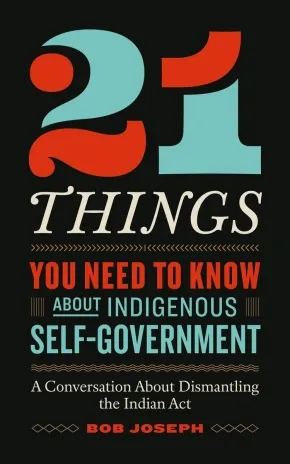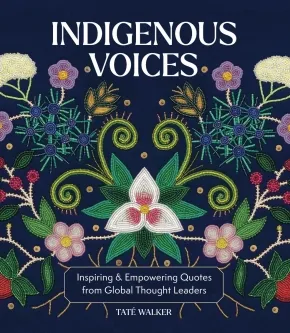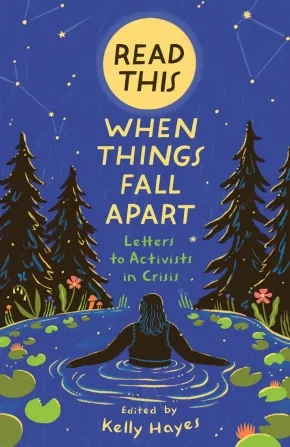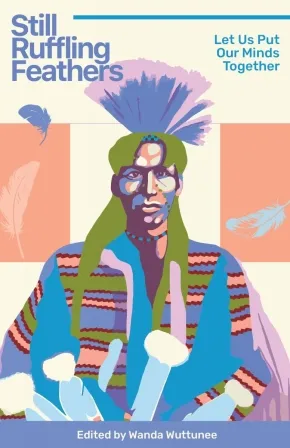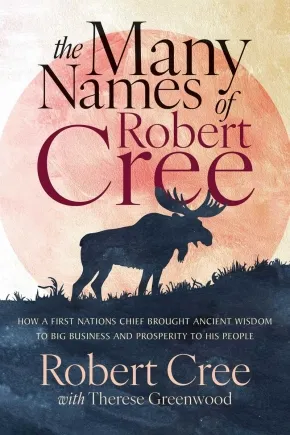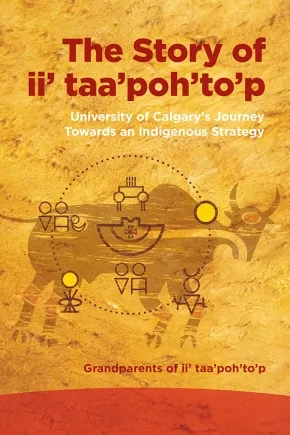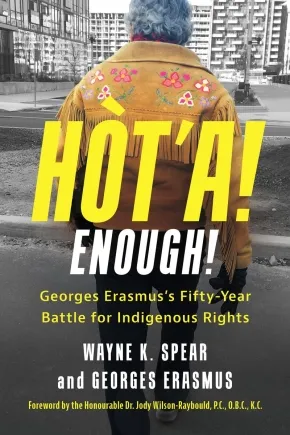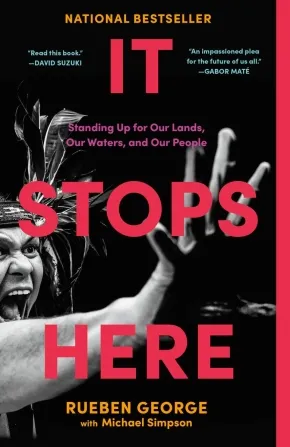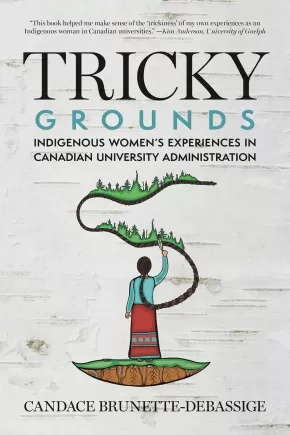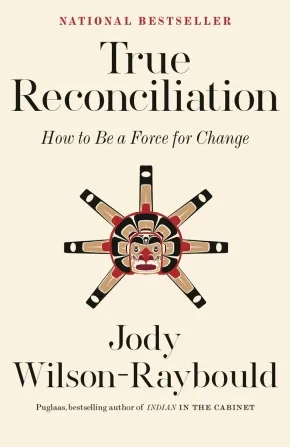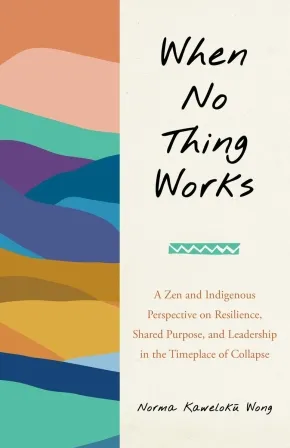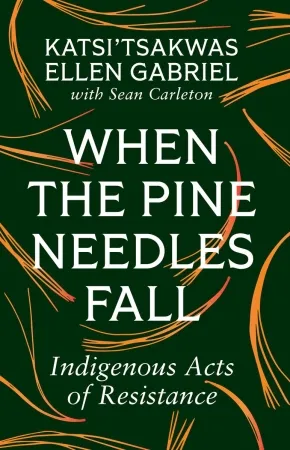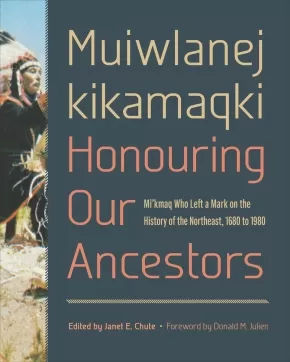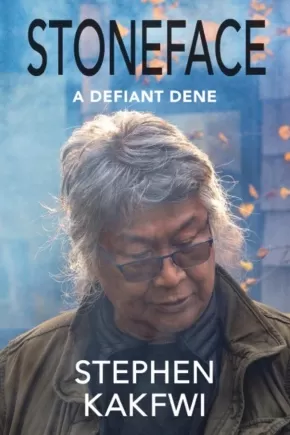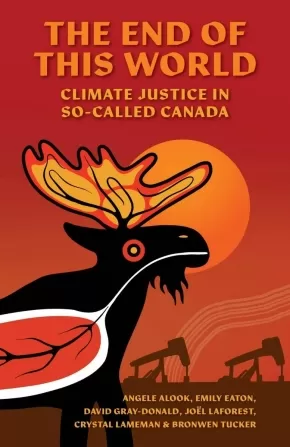
Leadership
1
-
15
of
39 Results;
Sort By
Go To
of 3
21 Things You Need to Know About Indigenous Self-Government: A Conversation About Dismantling the Indian Act
$24.95
Format:
Paperback
Text Content Territories:
Indigenous Canadian;
Grade Levels: 12; University/College;
ISBN / Barcode: 9781774586273
Synopsis:
Synopsis:
From the bestselling author of 21 Things™ You May Not Know About the Indian Act comes a powerful new book on dismantling the Indian Act and advancing Indigenous self-governance.
Bob Joseph’s 21 Things™You May Not Know About the Indian Act captured the attention of hundreds of thousands of Canadians by shining a light on the Indian Act and the problems associated with it. In that book, readers learned that the Consolidated Indian Act of 1876 has controlled the lives of Indigenous Peoples in Canada for generations, and despite its objective to assimilate Indians into the economic and political mainstream, it has had the opposite effect: segregation. They live under different laws and on different lands.
People came away from that book with questions such as "Can we get rid of the Indian Act?" and "What would that look like? Would self-government work?" These are timely questions, given that 2026 will mark 150 years since the Consolidated Indian Act of 1876. The short answer to these questions is, yes, we can dismantle the Act, and there are current examples of self-government arrangements that are working.
With his trademark wisdom, humility, and deep understanding, Bob Joseph shows us the path forward in 21 Things™ You Need to Know About Indigenous Self-Government: A Conversation About Dismantling the Indian Act, in which Indigenous self-governance is already happening and not to be feared—and negotiating more such arrangements, sooner rather than later, is an absolute necessity.
21 Things™ You Need to Know About Indigenous Self-Government: A Conversation About Dismantling the Indian Act is a call to action. Join the conversation now.
Additional Information
200 pages | 5.00" x 8.00" | Paperback
Indigenous Voices: Inspiring & Empowering Quotes from Global Thought Leaders
$25.99
Format:
Hardcover
Text Content Territories:
Indigenous Canadian; Indigenous American; Indigenous South American;
Reading Level: N/A
ISBN / Barcode: 9781577154914
Synopsis:
Synopsis:
Immerse yourself in Indigenous Voices, an inspiring volume of quotations by Indigenous thought leaders, activists, politicians, and scholars illustrated with stunning artwork by Indigenous artists.
This captivating book weaves together the timeless wisdom of Indigenous people from various nations and regions through a mosaic of more than 60 quotes, words, and stories by elders, leaders, activists, scholars, and influential contemporaries spanning all walks of life. Discover the diverse and unique heritage of extraordinary people like:
- Shina Novalinga – A member of the Inuk living in Montreal, Canada, Shina Novalinga is a content creator, singer, and activist who shares her Inuk culture across social media, of which an important aspect is traditional throat singing with her mother.
- Natali Segovia – A member of the Quechua, Natali Segovia is the Executive Director of the Water Protector Legal Collective and a human rights attorney. Her advocacy focuses on defending Water Protectors and human rights defenders facing repression for their activism.
- Corrina Gould – Of the Ohlone, Corrina Gould is the chair and spokesperson for the Confederated Villages of Lisjan, the Co-Director for the Sogorea Te' Land Trust, and the lead organizer for Indian People Organizing for Change.
- Elias Not Afraid – A member of the Apsáalooke (Crow), Elias Not Afraid is a mega-award-winning queer beader and fashion designer. He says, “When people think of native beadwork, they think trinkets and good luck charms and dream catchers but it’s far from it. I create wearable art that is durable and can be used daily and last over a lifetime and be used as a family heirloom.”
- Lily Gladstone – An American actress from the Blackfeet Reservation, Gladstone is of Piegan Blackfeet, Nez Perce, and European heritage. They earned critical acclaim for portraying Mollie Kyle, an Osage woman who survived the Osage Indian murders in Martin Scorsese’s film Killers of the Flower Moon, among other important roles in film and television.
- Kola Shippentower – A member of the Umatilla, Shippentower is the first Native American player for the Oregon Ravens, a tackle football team for women and non-binary players.
- Shiloh Maples – Of the Odawa, Maples is a citizen of the Little River Band of Indians based in Michigan. Through her interest in Indigenous food systems and her own Ojibwe and Odawa heritage, she developed the program Sacred Roots for the American Indian Health and Family Services in Detroit, where she taught cooking classes and promoted dishes using traditional, seasonal, and local ingredients in a way that improved participants’ health while connecting them with their culture.
- Alvera Sargent – Sargent, of the Akwesasne Mohawk, worked with the Akwesasne Freedom School, one of the oldest Indigenous language schools in North America. “My hope for our tribal community at large is that more of our people come back to our traditional space. I am grateful that our time has come as Indigenous people are being recognized for their traditional knowledge systems. The community is recognizing that Indigenous people do have the wisdom of our ancestors to share, which helps all areas of our society.”
- And more!
Indigenous Voices offers a unique opportunity to connect with ancient traditions, refresh your perspective with modern insight, and gain awareness and understanding that resonate across cultures and generations.
Additional Information
192 pages | 7.5" x 8.6" | Hardcover
Read This When Things Fall Apart: Letters to Activists in Crisis
$27.95
Editors:
Format:
Paperback
Text Content Territories:
Indigenous Canadian; Indigenous American;
Reading Level: N/A
ISBN / Barcode: 9781849355841
Synopsis:
Synopsis:
A bundle of letters to activists and organizers on the frontlines in catastrophic times from Let This Radicalize You co-author Kelly Hayes.
In social movements, some heartbreaks are all but inevitable. Campaigns will be lost. Mental health crises will occur. Social ills, like gender-based violence, will manifest themselves in movement spaces. People will experience profound personal losses. Grief, alienation, and despair can grind us under. Sometimes, we need accompaniment. Sometimes, we need to be met where we’re at by a caring voice of experience. Read This When Things Fall Apart is a care package for activists and organizers building power under fascistic, demoralizing conditions. It’s an outstretched hand, offering history lessons, personal anecdotes, and practical advice about how to navigate the woes of justice work. A survival guide for the heart, this is a book for activists to keep close, and to share with co-strugglers in need.
Personal, reflective, and hopeful, Read This When Things Fall Apart harnesses the writers' individual moments of despair into living, breathing wisdom that chips away at the supposed inevitability of fascist life. Restorative like a letter from a trusted friend and invigorating like a story from a mentor, the book is an indispensable companion for all of us navigating challenging times. Featuring letters from Mariame Kaba, Ashon Crawley, Leanne Betasamosake Simpson, Leah Lakshmi Piepzna-Samarasinha, Eman Abdelhadi, Brian Merchant, and more.
Reviews
"This marvelous book is essential reading for the times we find ourselves in."—Chanda Prescod-Weinstein, author of The Disordered Cosmos: A Journey into Dark Matter, Spacetime, and Dreams Deferred
"What a gift! We all need these letters, not just in times of crisis or defeat. It is the only book you’ll hold that will hold you, free you, permit you to fail, rest, retreat, grieve, live, laugh, fight, and heal—to be human. This book must never go out of print." —Robin D. G. Kelley, author of Freedom Dreams: The Black Radical Imagination
"Read this When Things Fall Apart is a balm of these dark times. This is the book I wish I'd had as a young organizer. It is a necessary text that sent me through the full kaleidoscope of emotions—spanning rage, laughter, and sadness—but more importantly, helped ground me in times of crisis and unrelenting brutality." —Robyn Maynard, co-author of Rehearsals for Living
“If you need an antidote to despair, this book is for you. It’s a repository of fortifying collective wisdom, a tonic for our troubled times. The letters Kelly Hayes has collected offer vital insights amid the darkness, shrewd strategic advice for aspiring change-makers, and a reminder none of us are in the fight alone.” —Astra Taylor, co-author of Solidarity: The Past, Present, and Future of a World-Changing Idea
“For years I've had a saying: resist the pleasures of doom. It can feel perversely good to tell ourselves that the situation is so bad we simply can't do anything, to throw up our hands and give up. This book is an antidote to the pleasures of doom—it offers the deeper, more sustaining pleasure of solidarity, in beautiful specificity, from committed organizers in a variety of movements. They have felt despair, stared into the void of defeat, and they share concrete advice about the ways we can keep going when all feels hopeless. This book is a profound act of care.” —Sarah Jaffe, author of From the Ashes: Grief and Revolution in a World on Fire
“Read this When Things Fall Apart: Letters to Activists in Crisis is a signpost for activists who feel unsettled about themselves and the future. The contributors offer their truths and wisdom with raw vulnerability. Read this When Things Fall Apart is a resource for anyone who believes hope will guide us through the darkest of times.” —Alice Wong, editor of Disability Intimacy: Essays on Love, Care, and Desire
"These letters are like seeds in a pomegranate—gorgeous gems full of nourishment, nestled together, shaped by one another, juicy, sweet and alive. The intimacy and urgency of these wise messages, written by people who have given so much to our movements and seen so much, is just what we need right now, in harrowing times, to help new people cross the threshold to collective action and to bolster the spirits of all who continue to press on, against difficult odds. I cannot wait to give this book to my students and the people I've been working with for decades. We all need what is in here." —Dean Spade, author of Mutual Aid: Building Solidarity During This Crisis (and the Next)
“In this time of monsters burying us in grief and despair, this extraordinary collection is a steady hand with advice, analysis and affirmation. Each generous and generative letter centers our love for ourselves and our people as methodology. This book is a compelling reminder that we need each other as comrades and community, that we all have gifts to contribute to movements, and that—through uncertainty and one million experiments—we will win.” —Harsha Walia, author of Border and Rule: Global Migration, Capitalism, and the Rise of Racist Nationalism
Additional Information
172 pages | 5.50" x 8.50" | Paperback
Still Ruffling Feathers: Let Us Put Our Minds Together
$24.95
Format:
Paperback
Text Content Territories:
Indigenous Canadian; First Nations; Cree (Nehiyawak); Plains Cree; Red Pheasant Cree Nation;
Reading Level: N/A
ISBN / Barcode: 9781772841183
Synopsis:
Synopsis:
Revisiting the political activism of WIC Wuttunee
William (Bill) Wuttunee was a trailblazing lawyer, a courageous native rights activist; and one of the architects of the process for the Truth and Reconciliation Commission. His 1971 book, Ruffled Feathers: Indians in Canadian Society, decried conditions on reserves and pressed for integration-on Indigenous peoples' own terms-supporting many of the aims of the Trudeau government's 1969 "White Paper." Though controversial at the time, Wuttunee's arguments were rooted in a foundational belief in the strengths of his people and a steadfast rejection of victimhood. In the fifty years that have followed its publication, Ruffled Feathers has been largely forgotten, though ideas that Wuttunee put forth-ending the Indian Act and the reserve system-continue to find space within contemporary Canadian political discourse.
In this volume, editor Wanda Wuttunee gathers a diverse cohort of scholars to engage with her father's ideas and offer their own perspectives on the opportunities and challenges facing Indigenous peoples in Canada, then and now. Favouring discourse over conclusions, Still Ruffling Feathers leads the reader to a nuanced understanding of the ongoing conversations and unresolved issues stemming from the Indian Act and invites us to envision miyo-pimâtisiwin, "the good life."
Reviews"
"Still Ruffling Feathers explores an important area of modern history on Indigenous leadership. The thoughts and ideas expressed by William Wuttunee still have resonance today." - Dr. Brian Caillou, University of Calgary
Educator Information
Table of Contents
Brotherhood by William I.C. Wuttunee
Acknowledgements
Contributors
Introduction by Wakchan (Wanda Wuttunee), Red Pheasant Cree Nation, Saskatchewan
Chapter 1. Reflections on a Legacy--An Eagle Eye Perspective by Wakchan (Wanda Wuttunee), Red Pheasant Cree Nation, Saskatchewan
Chapter 2. Still Ruffling Feathers Too--More than 50 Years Later by Makookins (Xakiji (Chief) Lee Crowchild), Tsuut'ina Nation, Alberta
Chapter 3. William Wuttunee--Ruffling Feathers in "Indian" Time and Space by Thohahoken (Michael Doxtater), Mohawk Turtle Clan Family of Satekariwate, Ontario
Chapter 4. Learning to Straighten Our Ruffled Feathers: An Education by Askîy Pihêsiw (Robert Falcon Ouelette), Red Pheasant Cree Nation, Saskatchewan
Chapter 5. Ruffled Feathers: A Critical Assessment by Bush Doctor (Peter Kulchyski), Bissett, Manitoba
Chapter 6. Final Thoughts--Debating Our Future, Coming to One Mind by David Newhouse, Onandaga, Six Nations of the Grand River, Ontario.
Appendix A: Excerpts from Ruffled Feathers (1971) by William I.C. Wuttunee
Appendix B. Selected Poetry of William I. C. Wuttunee
Appendix C. Discussion Questions Bibliography
Additional Information
204 pages | 5.50" x 8.50" | Paperback
The Many Names of Robert Cree: How a First Nations Chief Brought Ancient Wisdom to Big Business and Prosperity to His People
$26.95
Format:
Paperback
Reading Level: N/A
ISBN / Barcode: 9781770418301
Synopsis:
Synopsis:
A vital account of the life and many names of Robert Cree, and his plan for a peaceful, sincere, and just path to reconciliation in an angry and chaotic world.
His mother called him “Bobby Mountain.” Elders called him “Great Man.” His people called him “Chief.” Oil men called him “Mr. Cree.” But the government called him “Number 53.” Robert Cree was all of these while facing his people’s oppressors and freeing the ghosts of tortured spirits.
The Many Names of Robert Cree is his first-person account of survival in a brutally racist residential school system designed to erase traditional Indigenous culture, language, and knowledge. It is also the story of an epic life of struggle and healing, as Cree takes the wisdom of his ancestors and a message of reconciliation to the halls of government and to industry boardrooms.
In the storytelling tradition of his people, Cree recounts his early years in the bush, his captivity at a residential school, his struggles with addiction, his political awakening as one of Canada’s youngest First Nation Chiefs, and the rising Indigenous activism of the late 20th and early 21st centuries. He also recounts the oil industry’s arrival on his poverty-stricken reserve and the ensuing struggle to balance economic opportunity with environmental challenges.
Throughout, Cree’s leadership is rooted in his unshakable commitment to the sacred traditional teachings of his people. His beliefs give him the strength to focus on hope, dignity, and building a better future for his community. Now a respected Elder and spiritual leader, Cree champions forgiveness as a powerful force that can bring healing and transformation for all.
Additional Information
264 pages | 6" x 9" | Paperback
The Story of ii' taa'poh'to'p: University of Calgary's Journey Towards an Indigenous Strategy
$34.99
Format:
Paperback
Text Content Territories:
Indigenous Canadian;
Reading Level: N/A
ISBN / Barcode: 9781773856285
Synopsis:
Synopsis:
A dynamic framework for the development of an Indigenous strategy that shares the engaging story of ii’taa’poh’to’p at the University of Calgary.
The University of Calgary’s Indigenous strategy, ii’taa’poh’to’p, lays the path for a journey of transformation and renewal for truth and reconciliation through ways of knowing, doing, connecting, and being.
The Story of ii’ taa’poh’to’p is the story of the creation of the University of Calgary’s Indigenous Strategy. The result of an enlightening process of relationship building and deep learning and listening, it required the intentional and careful creation of parallel paths for institutional and Indigenous frameworks to create the strategy. Authentic conversations occurred in the ethical space between the parallel paths, allowing for increased understanding of differences and similarities between cultures.
This book captures powerful and emotional stories that emphasize the importance of reconciliation and decolonizing organizations. It demonstrates that trusting relationships can be developed between Indigenous and non-Indigenous relatives and lays out a dynamic framework and approach for the development of an Indigenous strategy.
The Grandparents of ii’ taa’poh’to’p welcome readers to learn from their experience. They share insightful lessons about the importance of being relational; honouring ways of knowing and doing from other cultures; developing generational strategies that persist over time; understanding the impacts of fear; and making assumptions about people’s prior knowledge. They discuss how relationship building through deep listening across cultures is essential to the development of an Indigenous strategy. The Story of ii’ taa’poh’to’p is essential reading for all those interested in the development of an Indigenous strategy in the pursuit of truth and reconciliation.
Educator Information
About the Authors: The Grandparents of ii ’taa’poh’to’p are a collective of leaders from diverse cultural backgrounds and experiences who guided the development of the Indigenous strategy at the University of Calgary.
Additional Information
176 pages | 6.00" x 9.00" | Paperback
Hòt'a! Enough!: Georges Erasmus's Fifty-Year Battle for Indigenous Rights
$28.99
Format:
Paperback
Text Content Territories:
Indigenous Canadian; First Nations; Dene;
Reading Level: N/A
ISBN / Barcode: 9781459752900
Synopsis:
Synopsis:
The political life of Dene leader Georges Erasmus - a radical Native rights crusader widely regarded as one of the most important Indigenous leaders of the past fifty years.
For decades, Georges Erasmus led the fight for Indigenous rights. From the Berger Inquiry to the Canadian constitutional talks to the Oka Crisis, Georges was a significant figure in Canada's political landscape. In the 1990s, he led the Royal Commission on Aboriginal Peoples and afterward was chair and president of the Aboriginal Healing Foundation, around the time that Canada's residential school system became an ongoing frontpage story.
Georges's five-decade battle for Indigenous rights took him around the world and saw him sitting across the table from prime ministers and premiers. In the 1980s, when Georges was the National Chief of the Assembly of First Nations, he was referred to as the "Thirteenth Premier." This book tells the personal story of his life as a leading Indigenous figure, taking the reader inside some of Canada's biggest crises and challenges.
Awards
- 2025 Indigenous Voices Awards - Prose in English Award
Additional Information
320 pages | 6.00" x 9.00" | 57 b&w illustrations | Paperback
It Stops Here: Standing Up for Our Lands, Our Waters, and Our People (PB)
$24.00
Format:
Paperback
Text Content Territories:
Indigenous Canadian; First Nations; Salish; Coast Salish; Tsleil-Waututh;
ISBN / Barcode: 9780735242821
Synopsis:
Synopsis:
A personal account of one man’s confrontation with colonization that illuminates the philosophy and values of a First Nation on the front lines of the fight against an extractive industry, colonial government, and threats to the life-giving Salish Sea.
It Stops Here is the profound story of the spiritual, cultural, and political resurgence of a nation taking action to reclaim their lands, waters, law, and food systems in the face of colonization. In deeply moving testimony, it recounts the intergenerational struggle of the Tsleil-Waututh Nation to overcome colonial harms and the powerful stance they have taken alongside allies and other Indigenous nations across Turtle Island against the development of the Trans Mountain Pipeline—a fossil fuel megaproject on their unceded territories.
In a firsthand account of the resurgence told by Rueben George, one of the most prominent leaders of the widespread opposition to the Trans Mountain Pipeline expansion, It Stops Here reveals extraordinary insights and revelations from someone who has devoted more than a decade of his life to fighting the project. Rueben shares stories about his family’s deep ancestral connections to their unceded lands and waters, which are today more commonly known as Vancouver, British Columbia and the Burrard Inlet. He discloses how, following the systematic cultural genocide enacted by the colonial state, key leaders of his community, such as his grandfather, Chief Dan George, always taught the younger generations to be proud of who they were and to remember the importance of their connection to the inlet.
Part memoir, part call to action, It Stops Here is a compelling appeal to prioritize the sacred over oil and extractive industries, while insisting that settler society honour Indigenous law and jurisdiction over unceded territories rather than exploiting lands and reducing them to their natural resources.
Additional Information
288 pages | 5.13" x 7.98" | 31 b+w images throughout | Paperback
Tricky Grounds: Indigenous Women's Experiences in Canadian University Administration
$34.95
Format:
Paperback
Text Content Territories:
Indigenous Canadian; First Nations; Cree (Nehiyawak); Swampy Cree ; Mushkegowuk;
Reading Level: N/A
ISBN / Barcode: 9780889779778
Synopsis:
Synopsis:
Breaks the deafening silence of Indigenous women’s voices in academic leadership positions.
Since the 2015 release of the report on the Truth and Reconciliation Commission of Canada, new Indigenous policies have been enacted in universities and a variety of interconnecting Indigenous senior administrative roles have been created. Many of these newly created roles have been filled by Indigenous women. But what does it mean for Indigenous women to be recruited to Indigenize Western institutions that have not undergone introspective, structural change?
Informed by her own experiences and the stories of other Indigenous women working in senior administrative roles in Canadian universities, Candace Brunette-Debassige explores the triple-binding position Indigenous women often find themselves trapped in when trying to implement reconciliation in institutions that remain colonial, Eurocentric, and male-dominated. The author considers too the gendered, emotional labour Indigenous women are tasked with when universities rush to Indigenize without the necessary preparatory work of decolonization.
Drawing on an Indigenous feminist decolonial theoretical lens and positioning Indigenous story as theory, Brunette-Debassige illustrates how Indigenous women can and do preserve and enact their agency through resistance, and help lead deeper transformative changes in Canadian universities. Ultimately, her work provides a model for how reconciliation and Indigenization can be done at an institutional level.
Reviews
“This book helped me make sense of the ‘trickiness’ of my own experiences as an Indigenous woman in Canadian universities.” —Kim Anderson, University of Guelph
Additional Information
320 pages | 6.00" x 9.00" | Paperback
True Reconciliation: How to Be a Force for Change (PB)
$23.00
Format:
Paperback
Text Content Territories:
Indigenous Canadian;
Reading Level: N/A
ISBN / Barcode: 9780771004407
Synopsis:
Synopsis:
There is one question Canadians have asked Jody Wilson-Raybould more than any other: What can I do to help advance reconciliation? It is clear that people from all over the country want to take concrete and tangible action that will make real change. We just need to know how to get started. This book provides that next step. For Wilson-Raybould, what individuals and organizations need to do to advance true reconciliation is self-evident, accessible, and achievable. True Reconciliation is broken down into three core practices—Learn, Understand, and Act—that can be applied by individuals, communities, organizations, and governments.
The practices are based not only on the historical and contemporary experience of Indigenous peoples in their relentless efforts to effect transformative change and decolonization, but also on the deep understanding and expertise about what has been effective in the past, what we are doing right, and wrong, today, and what our collective future requires. Fundamental to a shared way of thinking is an understanding of the Indigenous experience throughout the story of Canada. In a manner that reflects how work is done in the Big House, True Reconciliation features an “oral” history of these lands, told through Indigenous and non-Indigenous voices from our past and present.
The ultimate and attainable goal of True Reconciliation is to break down the silos we’ve created that prevent meaningful change, to be empowered to increasingly act as “inbetweeners,” and to take full advantage of this moment in our history to positively transform the country into a place we can all be proud of.
Additional Information
352 pages | 5.17" x 7.99" | Paperback
When No Thing Works: A Zen and Indigenous Perspective on Resilience, Shared Purpose, and Leadership in the Timeplace of Collapse
$24.95
Format:
Paperback
Text Content Territories:
Indigenous Polynesian; Indigenous Hawaiian;
Reading Level: N/A
ISBN / Barcode: 9798889840992
Synopsis:
Synopsis:
Spiritual and community lessons for embracing collective care, co-creating sustainable worlds, and responsibly meeting uncertain futures—a Zen and Indigenous take on building better, more balanced ways of being
Talking story, weaving poetry, and offering wisdom at the intersections of strategy, politics, and spiritual activism, When No Thing Works is a visionary guide to co-creating new worlds from one in crisis. It asks into the ways we can live well and maintain our wholeness in an era of collective acceleration: the swiftly moving current, fed and shaped by human actions, that sweeps us toward ever uncertain futures. Grounded in Zen Buddhism, interconnection, and decades of community activism, When No Thing Works explores questions like:
- As we stand at a threshold of collective change, what leaps must we make?
- How can we push through discord and polarization and meet these critical changepoints collectively?
- What practices, strategies, and spiritualities can align to vision a sustainable future for our communities and descendants?
- How can we step out of urgency to tend to our crises with wisdom, intention, and care?
With wise and witty prose that wanders and turns, guides and reveals, Zen master and Indigenous Hawaiian leader Rōshi Norma Wong’s meditation holds our collective moment with gravity and tender care. She asks us to not only imagine but to live into a story beyond crisis and collapse—one that expands to meet our dreams of what (we hope) comes next, while facing with clarity and grace our here and now in the world we share today.
Reviews
“Norma Ryuko Kawelokū Wong explores the essence of a twenty-first-century Indigenous worldview in When No Thing Works. She relies on knowing that all things, past and future, are in relationship. What we imagine and how we walk in the present determines the future. As Norma signals, our walk must include leaps that take us into unknowns, but we will not be alone. Norma gives us wise counsel for this difficult moment on Mother Earth. One culture, one belief system, one community alone is unable to fulfill our ancestors’ collective hopes for all of our descendants. As Norma’s ancestors said, ‘O ka ehu kakahiaka . . . The red dawn of our people became the red dawn of many peoples.’ Hawwih (thank you in Caddo), Norma, your family, and your people!”—Judith LeBlanc, citizen of the Caddo Nation, ekah (grandmother), and executive director of the Native Organizers Alliance
“As we stand at the threshold of collapsing systems and broken hearts, there is an opening. In When No Thing Works, Rōshi Norma Wong gives us a compass for how to navigate the space in between where we are coming from and where we are going. This book is an invitation to practice who we need to be to meet this moment and shape a future of possibility and potential.”—Kerri Kelly, author of American Detox
Additional Information
120 pages | 5.51" x 8.51" | 6 b&w photos | Paperback
When the Pine Needles Fall: Indigenous Acts of Resistance
$32.95
Format:
Paperback
Text Content Territories:
Indigenous Canadian; First Nations; Haudenosaunee (Iroquois); Kanyen'keha:ka (Mohawk); Kanehsatà:ke; Kahnawà:ke ;
Reading Level: N/A
ISBN / Barcode: 9781771136501
Synopsis:
Synopsis:
There have been many things written about Canada’s violent siege of Kanehsatà:ke and Kahnawà:ke in the summer of 1990, but When the Pine Needles Fall: Indigenous Acts of Resistance is the first book from the perspective of Katsi’tsakwas Ellen Gabriel, who was the Kanien’kehá:ka (Mohawk) spokesperson during the siege. When the Pine Needles Fall, written in a conversational style by Gabriel with historian Sean Carleton, offers an intimate look at Gabriel’s life leading up to the 1990 siege, her experiences as spokesperson for her community, and her work since then as an Indigenous land defender, human rights activist, and feminist leader.
More than just the memoir of an extraordinary individual, When the Pine Needles Fall offers insight into Indigenous language, history, and philosophy, reflections on our relationship with the land, and calls to action against both colonialism and capitalism as we face the climate crisis. Gabriel’s hopes for a decolonial future make clear why protecting Indigenous homelands is vital not only for the survival of Indigenous peoples, but for all who live on this planet.
Awards
- 2025 Canadian Historical Association Indigenous History Book Prize
- 2025 Errol Sharpe Book Prize
- 2025 Wilson Institute Book Prize
Reviews
“When the Pine Needles Fall is a profound treatise and manifesto chronicling Haudenosaunee resistance to land theft by one of the most important Land Defenders of our time. Gabriel’s work is the book on Indigenous resistance I’ve been waiting for my whole life. It is a must-read for anyone concerned with the continuation of life on this planet.” — Leanne Betasamosake Simpson, co-author of “Rehearsals for Living”
“Katsi’tsakwas Ellen Gabriel’s words in When the Pine Needles Fall are gifts that serve as a beacon of light by igniting our hearts, minds, and spirits. Through her boundless wisdom grounded in healing work as a Land Defender on Turtle Island, she calls for fierce Indigenous resistance and radical global solidarity to put an end to root causes of oppression worldwide: capitalism, patriarchy, and settler colonialism. Gabriel reminds us that a more just, kind, and caring world—where all life is precious—is possible for the next seven generations, but only if we fight for it.” — Samir Shaheen-Hussain, MD, author of “Fighting for A Hand to Hold: Confronting Medical Colonialism against Indigenous Children in Canada”
“When the Pine Needles Fall is a remarkable and revelatory account of the 1990 siege of Kanehsatà:ke and Kahnawà:ke, when provincial, municipal, and national armed forces targeted these Mohawk communities. It is also one of the best first-hand accounts of Indigenous activism that I have ever read, relayed in moving and extraordinary form. An essential addition to contemporary First Nations history and the growing field of Indigenous Studies.” — Ned Blackhawk, Western Shoshone, author of “The Rediscovery of America: Native Peoples and the Unmaking of U.S. History”
“As a treatise on women and culture-based governance from a remarkable Haudenosaunee leader, When the Pine Needles Fall offers me hope and renewed energy. Through her life work, Ellen Gabriel demonstrates how to persevere, remain optimistic, and continue with creative and activist endeavours. The book effectively situates the ‘crisis’ within its centuries-long context, marking a tipping point for Canada while highlighting ongoing challenges. It also examines how mainstream narratives are constructed around Indigenous struggles, providing a comprehensive profile of Gabriel’s diverse contributions to Indigenous resistance and resurgence.” — Kim Anderson, author of“ Life Stages and Native Women: Memory, Teachings, and Story Medicine”
“Katsi’tsakwas Ellen Gabriel’s personal account of the 1990 siege of Kanehsatà:ke and Kahnawà:ke is a crucial contribution to our understanding of these dramatic events and of the political context of the time. Her lifetime dedication to the defence of Indigenous peoples and women’s rights is truly exemplary and constitutes an inspiration for generations to come.” — Bernard Duhaime, professor, Faculty of Political Science and Law, Université du Québec à Montréal
“In When the Pine Needles Fall, celebrated activist Katsi’tsakwas Ellen Gabriel gifts us with an expansive account of the 1990 siege of Kanehsatà:ke and Kahnawà:ke. This alone provides a captivating analysis of this seminal moment and its legacy within larger movements for Indigenous sovereignty on Turtle Island. But Gabriel, an artist, also paints the negative space, braiding her relationship to the land, Kanien’kehá:ka teachings, and the language with her tireless work against settler colonialism, extractive capitalism, and patriarchy. This essential book is an inspiring conversation reminding us that decolonization is world-building rooted in an ethics of relationality and care.” — Nazila Bettache, MD, MPH; assistant professor of medicine, Université de Montréal; social justice organizer and co-editor of “Reflections on Illness”
“I honour my sister whose words speak the truth. One of the most powerful quotes by Katsi’tsakwas is: ‘I’m a Kanien’kehá:ka woman who cares deeply about our land and I want a better future for the generations to come.’ Everything she speaks about in this book is directly connected to these words.” — Beverley Jacobs, CM, LLB, LLM, PhD; Kanien’kehá:ka, Bear Clan, Six Nations Grand River Territory; associate professor, Faculty of Law, University of Windsor
Additional Information
280 pages | 5.50" x 8.50" | Paperback
Muiwlanej kikamaqki - Honouring Our Ancestors: Mi'kmaq Who Left a Mark on the History of the Northeast, 1680 to 1980
$150.00
Editors:
Format:
Hardcover
Text Content Territories:
Indigenous Canadian; First Nations; Mi'kmaq;
Reading Level: N/A
ISBN / Barcode: 9781487546137
Synopsis:
Synopsis:
Drawing upon oral and documentary evidence, this volume explores the lives of noteworthy Mi’kmaw individuals whose thoughts, actions, and aspirations impacted the history of the Northeast but whose activities were too often relegated to the shadows of history.
The book highlights Mi’kmaw leaders who played major roles in guiding the history of the region between 1680 and 1980. It sheds light on their community and emigration policies, organizational and negotiating skills, diplomatic endeavours, and stewardship of land and resources. Contributors to the volume range from seasoned scholars with years of research in the field to Mi’kmaw students whose interest in their history will prove inspirational. Offering important new insights, the book re-centres Indigenous nationhood to alter the way we understand the field itself. The book also provides a lengthy index so that information may be retrieved and used in future research.
Muiwlanej kikamaqki – Honouring Our Ancestors will engage the interest of Indigenous and non-Indigenous readers alike, engender pride in Mi’kmaw leadership legacies, and encourage Mi’kmaw youth and others to probe more deeply into the history of the Northeast.
Reviews
"This book is an invaluable and original offering. Muiwlanej kikamaqki – Honouring Our Ancestors makes a significant contribution to Mi’kmaq history by successfully bringing little-known individuals into the light and by placing them in a historical context that is uniquely informed by both written and oral narratives. For Mi’kmaq wanting to know more about their history, this book will be a wonderful source." - Natasha Simon, Nihkanatpat (Director) of the Mi’kmaq-Wolastoqey Centre, University of New Brunswick
"This book is deeply researched, both in written sources and in integrating the invaluable evidence of Indigenous knowledge. The detailed individual and family histories are uniquely effective in bringing out both changes and continuities in Mi’kmaw history and in the texture of Mi’kmaw interactions with non-Indigenous sojourners and settlers. With a remarkable and outstanding depth of scholarship, the book meticulously pursues biography as an approach that can be extended to people whose lives have too often been deemed to be insufficiently documented for conventional purposes, in order to take our historical understanding in innovative and productive directions."- John Reid, Professor of History, Saint Mary’s University
Additional Information
1004 pages | 8.00" x 10.00"| 62 b&w illustrations | Hardcover
Stoneface: A Defiant Dene
$28.00
Format:
Paperback
Text Content Territories:
Indigenous Canadian; First Nations; Dene;
Reading Level: N/A
ISBN / Barcode: 9781773861074
Synopsis:
Synopsis:
Stephen Kakfwi was born in a bush camp on the edge of the Arctic Circle in 1950. In a family torn apart by tuberculosis, alcohol and the traumas endured by generations in residential school, he emerged as a respected Dene elder and eventually the Premier of the Northwest Territories.
Stephen belongs to a cohort of young northerners who survived the childhood abuses of residential school only to find themselves as teenagers in another residential school where one Oblate father saw them as the next generation of leaders, and gave them the skills they would need to succeed. Kakfwi, schooled on civil rights and 1960s protest songs, dedicated himself to supporting chiefs in their claim to land that had been taken away from them and in their determination to seize control of the colonial political system.
Kakfwi’s life has been a series of diverse endeavours, blending traditional Dene practices with the daily demands of political office—hunting moose one day and negotiating with European diamond merchants the next. Throughout his career, Kakfwi understood that he held the power to make change—sometimes he succeeded, sometimes he did not. But he also embraced the power of story-telling, and has helped change the story of the North.
Kakfwi combines his remarkable memory for detail with his compelling raconteur’s skill in taking us through the incredible story of his life and one of the most transformative times in Canadian history. In his candid description of the loneliness of leadership and his embrace of Dene spirituality, Kakfwi’s Stoneface transforms politics into philosophy and an intensely personal guide to reconciliation.
Additional Information
240 pages | 6.00" x 9.00" | Paperback
The End of This World: Climate Justice in So-Called Canada
$25.95
Format:
Paperback
Text Content Territories:
Indigenous Canadian;
Reading Level: N/A
ISBN / Barcode: 9781771136129
Synopsis:
Synopsis:
The climate crisis is here, and the end of this world—a world built on land theft, resource extraction, and colonial genocide—is on the horizon. In this compelling roadmap to a livable future, Indigenous sovereignty and climate justice go hand in hand.
Drawing on their work in Indigenous activism, the labour movement, youth climate campaigns, community-engaged scholarship, and independent journalism, the six authors challenge toothless proposals and false solutions to show that a just transition from fossil fuels cannot succeed without the dismantling of settler capitalism in Canada. Together, they envision a near future where oil and gas stay in the ground; where a caring economy provides social supports for all; where wealth is redistributed from the bloated billionaire class; and where stolen land is rightfully reclaimed under the jurisdiction and sovereignty of Indigenous peoples.
Packed with clear-eyed analysis of both short- and long-term strategies for radical social change, The End of This World promises that the next world is within reach and worth fighting for.
Reviews
“The End of This World gifts readers with a mapping of a communal future grounded in Indigneous concepts of caring, relationship, solidarity, and a sharp analysis of the present. It is a gathering space, an experiment, and an invitation towards building formations of life outside of the cage of colonialism and capitalism. Engaging, timely, and crucial, I am so grateful this book exists, and for the futures it will inspire."— Leanne Betasamosake Simpson, co-author of “Rehearsals for Living”
"This book is a major and much-needed contribution to the climate conversation in Canada. The collective behind it embodies the very politics necessary to win a just transition that is worthy of the name: Indigenous-led, internationalist, rooted in solidarity, and crackling with moral clarity. The End of This World advances a holistic, radically reasonable vision of a future worth fighting for—and the authors have tallied the receipts for that glorious moment when the perpetrators of planetary arson get served the bill.”— Avi Lewis, co-author of “The Leap Manifesto”
Additional Information
240 pages | 5.50" x 8.50" | Paperback
Sort By
Go To
of 3

